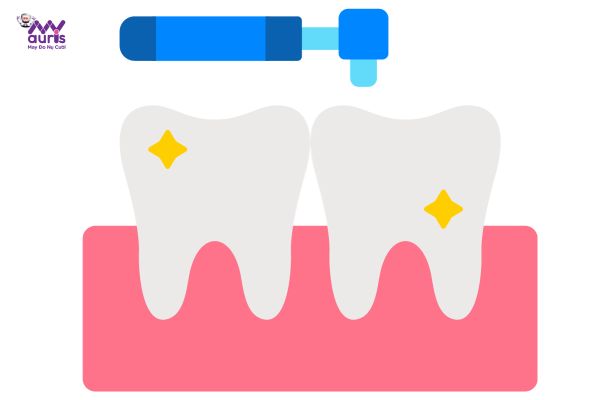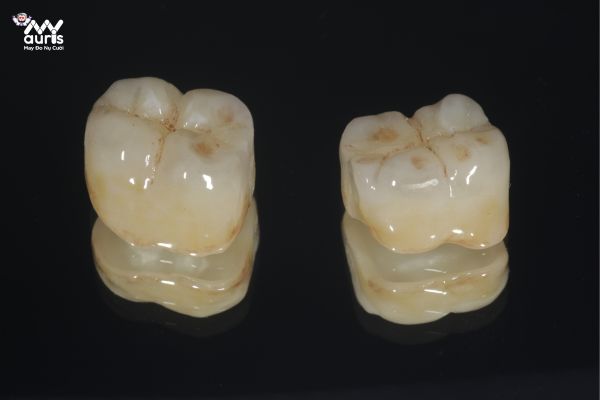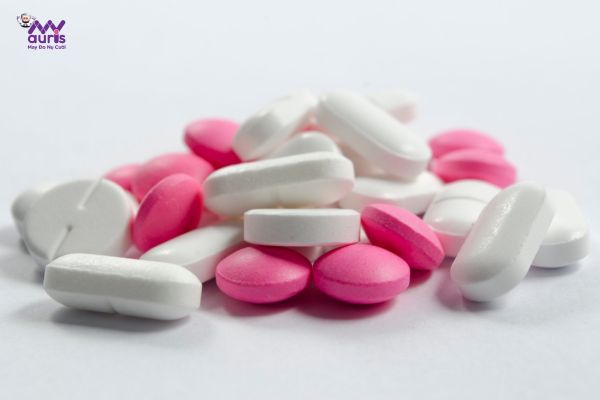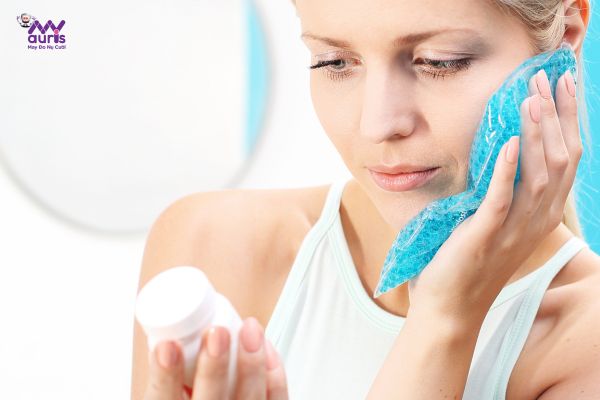Porcelain dental crowns are a form of beautifying and refurbishing teeth. However, there are quite a few cases of pain after getting porcelain crowns, so you can’t help but worry. Along with that, people who intend to get porcelain veneers that sound so painful also hesitate and don’t dare to do it. So what is the cause ofthe pain of porcelain teeth? Let’s find out with My Auris dentistry through the following article.
Causes of pain from porcelain crowns
Sensitiveness and pain from porcelain crowns may appear in the first 3-5 days after placement. Porcelain is very normal. According to doctors, there is no need to worry about this condition. Just know how to eat, take care of your teeth and practice proper oral hygiene and you will quickly get better. However, if this condition persists and the pain does not improve, you need to return to the dentist to be examined by a doctor, find the cause and fix it as soon as possible.
Due to weak teeth
Before performing porcelain crowns, the doctor will do a general examination of the condition and oral health. This is to see if the tooth is suitable for porcelain crown. Because teeth are sensitive and weak, still wearing porcelain will lead to prolonged pain and sensitivity.
The pulpitis has not been thoroughly treated yet
Pulpitis, if not thoroughly treated before porcelain veneers, can also cause prolonged pain and sensitivity. Even in cases of undetected pulpitis, porcelain crowns still cause the tooth to become necrotic, affecting the nerves, causing prolonged pain and swelling, and ultimately requiring the tooth to be removed.

The gums have not yet adapted
When grinding teeth and installing ceramic crowns, the gums will become sensitive more and cause more pain. It takes time for the gums to adapt and become accustomed to no longer being sore or sensitive.
Real teeth are invaded too much
If the dentist does not calculate the ratio and grinds the teeth too much, the real teeth will be invaded too much, exposing the dentin, causing sensitivity and pain. In addition, if porcelain teeth are not made properly, they will not be able to fit tightly to the gums, food residue can easily accumulate, causing inflammation and leading to prolonged pain.

The bite is misaligned
The pain after porcelain crowns can come from the cause of bite misalignment during the process of installing porcelain teeth. Porcelain crowns that do not match or are not accurate cause the porcelain teeth to protrude higher than normal or deviate from the opposing teeth, causing chewing force to be placed on the porcelain teeth. This causes the teeth to ache, become stuck, and cause pain in the temporomandibular joint.
Dental diseases
In addition to thoroughly treating pulpitis, detecting tooth decay, gingivitis, and periodontitis is also very important to avoid pain after porcelain crowns. If a tooth has cavities that are not detected or treated before being covered with porcelain, it will cause bacteria to strongly attack the tooth pulp. From there, it causes pulpitis, more severe tooth abscess and permanent tooth loss.
In addition, when periodontitis occurs, the gums tend to recede from the tooth roots and cannot keep the teeth firmly on the jaw. Therefore, if not detected early, it will affect the longevity of porcelain teeth and even lose real teeth.
Due to bad habits
The habit of grinding teeth after porcelain veneers will cause the opposing teeth to exert strong and continuous impact on the porcelain teeth. From there, the teeth are subjected to a lot of pressure, causing lasting pain and sensitivity.
The dental glue material is leaking
To fix the porcelain teeth on the jaw, the doctor will use dental glue to stick them. However, if porcelain crowns are performed at a dental clinic that does not ensure quality, the machinery technology is not modern, and the glue quality is not good, it will easily leak to the outside. This also causes tooth pain and sensitivity, affecting the gums after porcelain crowns.
The material used to make porcelain teeth is not good.
If the porcelain teeth are of poor quality, of unknown origin, the gums will be irritated or the thermal conductivity is not guaranteed, causing pain when eating food. hot, cold.

Improper diet
After porcelain crowns, eating hard or too chewy foods can also cause tooth pain. In addition, poor oral hygiene also makes it easy for bacteria to attack. If the porcelain cracks, the bacteria will be able to attack the real tooth pulp, causing sharp pain.
How to overcome pain after porcelain crowns
Pain after porcelain crowns You can do some pain relief methods at home to relieve the uncomfortable feeling. However, if the pain persists and shows no signs of improvement, people should go to the dentist immediately to have a doctor examine and treat it as soon as possible. This avoids complications and unwanted consequences.
Using pain relievers
Everyone can consult a doctor for advice and opinions on the appropriate use of pain relievers. However, you should not abuse it but should comply with treatment from your doctor to avoid affecting your health.

Gargle with salt water
Use salt water with the appropriate concentration to gargle will help eliminate bacteria and clean slime around porcelain teeth. People can make their own salt at home by adding 2 teaspoons of salt to warm water and stirring until it dissolves and can gargle.
Apply ice packs
This is a way to temporarily relieve pain afterthe pain of porcelain crowns. People can put ice in a bag or towel to apply to the painful area after porcelain treatment. Note, do not apply the compress directly to the porcelain crown because it will make the pain worse. Besides, you should not leave the cold compress in one place for too long as it will damage the skin right there.

Use a mouth guard
If the cause of porcelain crowns is pain Due to teeth grinding, people should consult a doctor to choose a suitable tooth protector. Dental guards will prevent the teeth in the jaw from colliding with each other.
Maintain appropriate eating and oral hygiene habits
After getting porcelain crowns, everyone should have a suitable diet to avoid pain. Avoid eating foods that are too hot, too cold, too hard, too chewy or contain a lot of acid. Besides, maintain the habit of gently brushing your teeth at least twice a day. Use a rolling pinSoft bristles to avoid affecting teeth and gums. Combine the use of dental floss and water floss to clean the oral cavity more effectively.
Hopefully the information in the article about ceramic crowns and pain helps people understand some of the causes. From there, to get safe, painless porcelain crowns, people should choose a reputable, quality dentistry that ensures machinery, skills and doctor expertise. Please contact My Auris dentistry immediately for more detailed advice and answers.
Anh Thy





